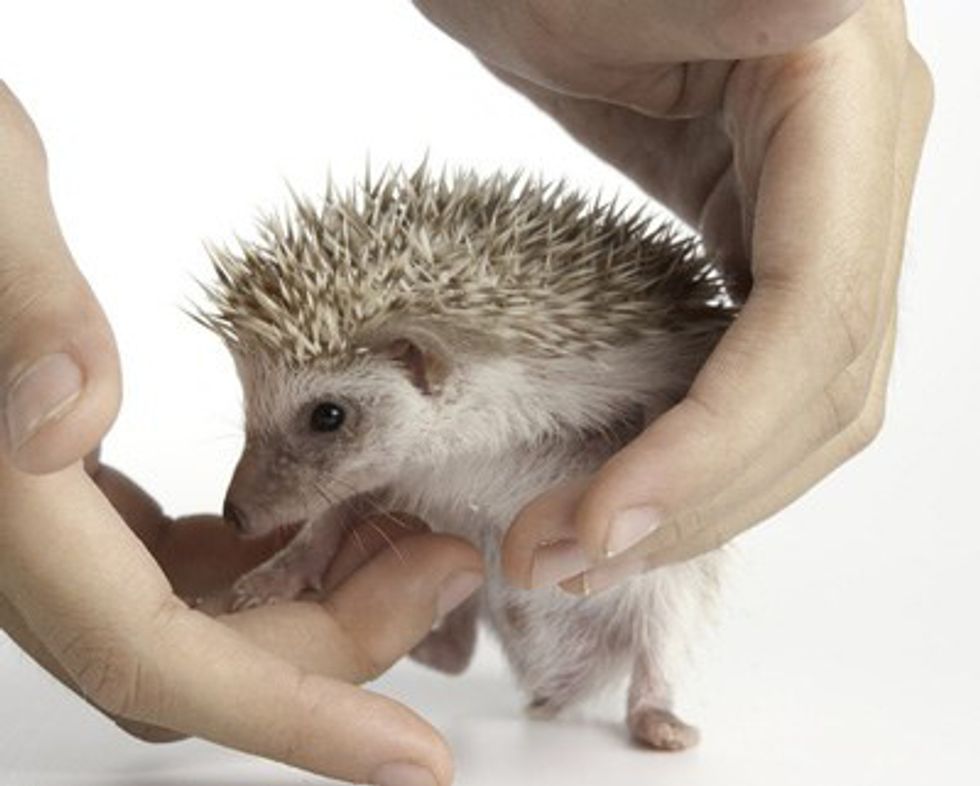Recently, I welcomed the newest member to my family... My hedgehog.
The process was long, but worthwhile. It all started by me communicating with a breeder, before weeks later deciding to pick up one of the new babies when they were old enough. I settled with a girl, and after picking her up I named her... Matilda.
Hedgehogs popularity as pets is continually increasing, as they make great pets, however there are so many things that people should know before choosing to adopt one of these companions. I asked my fellow hedgehog owners what they found the most challenging after bringing their hedgehog home, in order to compile this list of the things everyone should know before adopting a hedgehog.
1. Pick a reputable source.
Get your hedgehog from a proper breeder that has experience (preferably in your area). This is important not only for your hedgehogs health, but because you have people to rely on to ask questions and get clarifications.
2. They have unique personalities.
Not surprisingly, they are living animals with personalities and unique traits. Just like a cat or dog, they are all different. Whilst my hedgehog doesn't mind being handled, some refuse to bond and may never become completely comfortable or want to snuggle. They have unique temperaments, and just because the hedgehog you saw on Instagram enjoyed cuddles and belly rubs, doesn't mean yours necessarily will. (In fact, it's pretty slim.)
3. Research.
Hedgehogs, as mentioned, make great pets, but they are not all the same. Research is incredibly important as it will help you get the idea of a hedgehog put into your mind in a realistic fashion- instead of basing it off the cute pictures and videos you've seen around social media.
Research is important not only for understanding their temperament, but also the ways to give your pal the best way of life; including their environment, cage setup, food, treats, toys and more. Research can be as simple as googling "What should I consider before getting a hedgehog," and checking that you will be compatible.
4. Temperament.
Naturally hedgehogs are shy, nervous, do not come when called and do not display affection to their owners. They are also nocturnal, so it may appear that they do not do anything throughout majority of the day (because they don't). It may take some time for them to get used to you, and as I have briefly mentioned previously, some may never be the cuddly and cute companions you have seen elsewhere.
5. They're prickly.

I know this one sounds like a no-brainer, but hedgehogs are covered in spines. Their defense mechanism, as small prickly animals, includes twitching and jumping so as to become spiky when held. Handling them can take time, and can be painful until you are more confident.
6. Patience is key.

This should probably be number one, as it's the thing I personally struggled with the most, but these are all equally important. It takes weeks, even many months, for hedgehogs to be accustomed to your scent and your handling. It is easy to become discouraged that your hedgehog "hates" you or doesn't like to be around you because they will show a lack of interest- be patient.
The key is small amounts of handling frequently- when I got Matilda I started with 20 minutes per handling and worked up to 30 or more depending on her comfort level, and tried to handle her at least twice a day.
7. Time commitment.
Just like having almost any animal, hedgehogs are a time commitment. They are nocturnal, meaning that their bodies work on a different clock than ours. They do need bonding, and human attention, so consider the time commitment that includes handling and interacting late at night- if you're a college kid like me, this may pose no disruption to your schedule.
Don't forget that with an animal comes responsibility- including cage and environment cleaning and maintenance regularly.
8. Cage and its setup.
Many of the things you will find when researching can be confusing, or send mixed signals. Don't use cedar shavings, sawdust, hay or straw, garden soil or leaves or gravel. This should all come as part of the research process, but educate yourself on the dangers of certain beddings for your hedgehog BEFORE bringing them home. The most common setup for bedding includes fleece lining cleaned regularly.
Do not keep them in a tank or aquarium, they require a cage with specific requirements- one they cannot climb or injure themselves in. I keep Matilda in a Sterilite Tub. Another thing to consider within this is space- they require a fairly large amount of space despite being a small animal- plan for at least the cage size of a guinea pig.
You will need a food bowl, and water bowl, along with many places for the hedgehog to hide (igloos, PVC pipes, empty toilet rolls to name a few options.) It is important to purchase toys including a wheel for them to run on for exercise, and many owners purchase external setups for play-pens which the critter can explore supervised. You will also need a heater, external light, and a thermometer for monitoring temperature.
9. Money.
As I have stated many times, hedgehogs are living creatures. They require care and maintenance, which comes with a cost. Not only do you have to fork out cash in the beginning, when purchasing the animal and its setup, but throughout time for treats, new bedding, new toys, food, vet trips, and more. If you do not think you will be able to afford these things, please consider this before purchasing a hedgehog and having to give it away due to it's cost.
10. Temperature.
Hedgehogs require a lot of attention when it comes to their temperature. The recommended temperatures range between 74 and 78 degrees as their ideal temp, but some hedgehogs prefer this warmer or cooler depending. If they get too hot, they can suffer detrimental effects of heatstroke, and ultimately die, and it is the same with the cold. If they get too cold, they can go into false hibernation (Domesticated hedgehogs do NOT hibernate) and their organs will slow, ultimately leading to death. It is important to provide an environment for your hedgehog that will not fluctuate and will remain, as much as possible, within the ideal temperature ranges for their survival.
11. Forums.
There is an abundance of extra resources you can access both before and after getting a hedgehog that will be invaluable. One of these include Facebook groups or sites that are a hedgehog based community; for all things from advice to actually contacting a breeder. One of the most useful groups I have joined since adopting Matilda is "Hedgehogs Anonymous" on Facebook- it is my go-to for quick questions, insight, and of course cute pictures.
12. All things aside...

Hedgehogs are a fantastic pet that are growing in popularity. Just know what you're getting yourself into before deciding to adopt one, because they aren't as easy as they may seem. When you are prepared, however, I promise you won't regret it.























